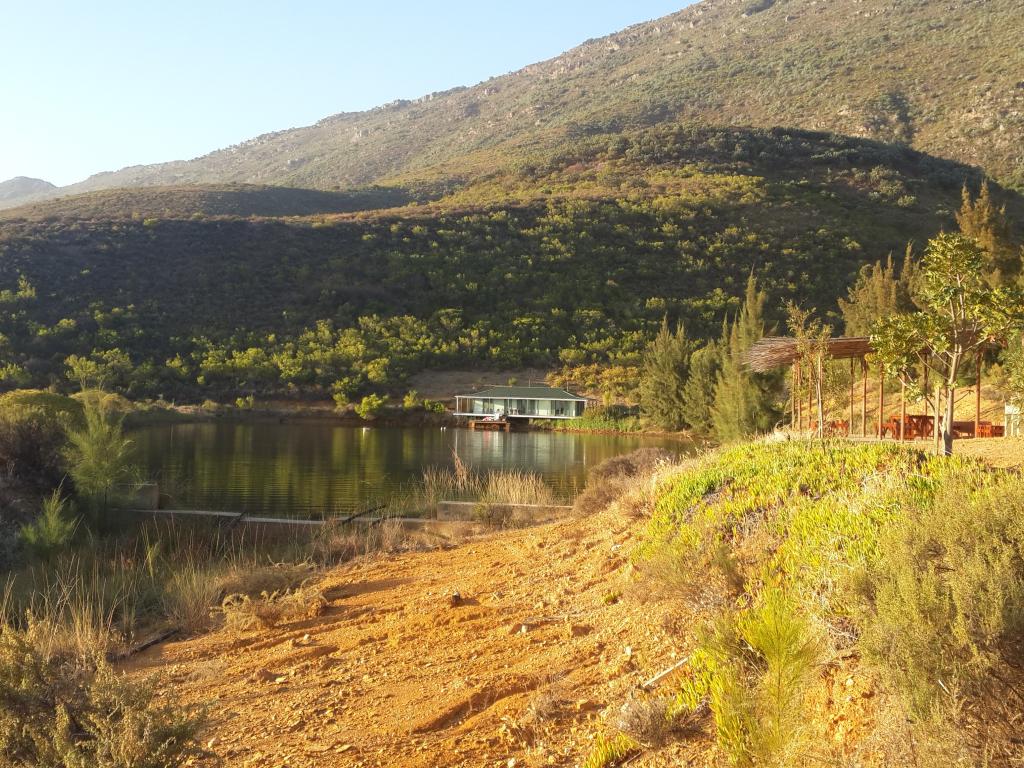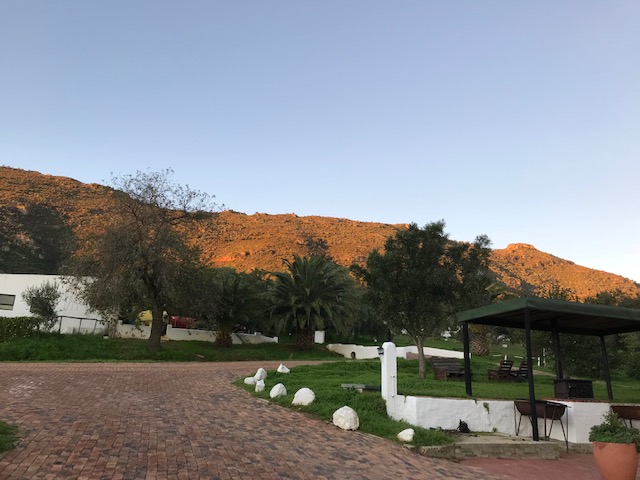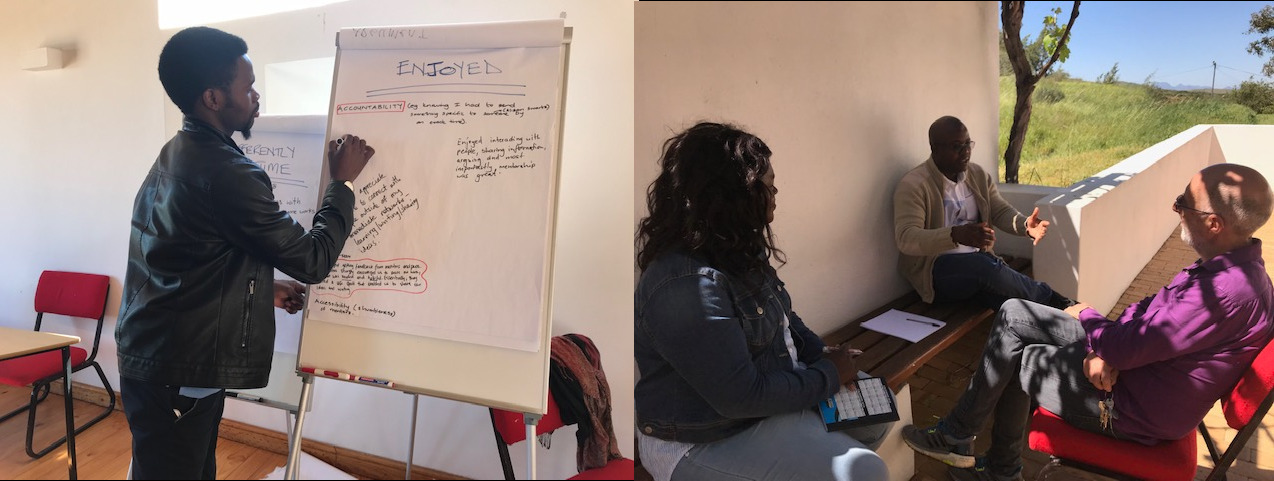Personal Reflections From Attending the British Academy Writing Workshop

Catherine (Katie) Pereira (PhD Student, UWC)
Editorial Note: Catherine (Katie) Pereira is a lecturer in the Department of Dietetics at the University of the Western Cape (UWC). She is currently also registered as a PhD candidate at UWC. In this article, Katie reflects on her experiences of attending one of the Division's writing workshops this year, organised and sponsored by the British Academy Writing Programme.
Since 2014, I have been trying to write up a publication from my master’s research, a qualitative project that focused on the fruit and vegetable consumption in the area of Mitchells Plain, an urban community in Cape Town. Due to other responsibilities, the publication is still in process. In May 2018, I received an announcement explaining that there was ‘an opportunity for post-grad students and early career scholars to submit an application to join 4-day writing workshops in June and October this year’. The call specifically stated that the aim was to ‘Strengthen critical social science in global health’. My master’s thesis topic fitted neatly into the programme which made it an ideal opportunity to finally write up this publication. I had also just registered for my PhD and hoped to first publish my master’s work before fully immersing myself in new research.
Funded by the British Academy, the Writing Workshop is a collaborative initiative between DSBS (Chris Colvin and Alison Swartz), London School of Hygiene and Tropical Medicine (LSHTM) (Virginia Bond and Janet Seeley) and the African Health Research Institute (AHRI) in KwaZulu Natal. The face-to-face components of the Writing Workshop were planned in June and October 2018 at the Goedgedacht Farm in Malmesbury. The outcome of the Writing Workshop is to encourage and support early career researchers in the Global South to publish academic output in high impact journals.
Before going to the Writing Workshop, I was slightly sceptical about the approach of ‘going away to write’. Instead of taking up the time to travel to another location and attend sessions on how to write, I thought I should just use that time to write. Generally, I feel quite confident as a writer as English is my first language and I have written plenty in the past. I thought that my main challenge was finding the time to write. Furthermore, I felt slightly embarrassed that I was arriving with research findings that I had been trying to write up for four years and I thought it would be outdated or not substantial enough to become a publishable article.

Initially, I thought that I was the only one who struggled to find time to write when dealing with various other responsibilities, but many other participants shared the same experience. Being in this structured environment where I felt obligated to produce by peers and mentors around me, I adhered to the soft rules that were set in place regarding limiting distractions. I realised that I did not need to check my emails or phone as often as I usually did and managed to temporarily resist the culture of instant messaging. While there are many challenges with regards to writing, there are also ways in which to limit these challenges and set boundaries to allow ourselves to write.

One of the requirements to keep momentum in between the writing retreats was to work individually on our publications, send sections of our work to peers and mentors for feedback, and arrive at the second workshop with a draft manuscript. Similarly to many other seminars or workshops I attend, I left the first retreat feeling inspired and energised to write. However, as soon as I got back to work and home, I got caught up with a backlog of emails and overdue tasks in my professional and personal life. Very quickly, the weeks started to fly by and despite a few emails sent by the facilitator, I lost momentum quickly. Some participants made significantly more progress than others in the interim. Personally, I struggled with slipping back into old patterns and struggled to change my behaviour and implement lessons learned from the first workshop. My biggest challenge was making time and creating a space to write. I also felt vulnerable sending drafts of my work and only submitted my paper to my peers and mentors in the weekend before the workshop.
|
Quotes from Participants Namhla Sicwebu: "The The BA workshop has been transformative. When I completed my MPH mini-dissertation in 2017, I had every intention to turn my article into a publication. However, as the months dragged by, the task seemed impossible-monumental. Fortunately, the BA workshop provided me with mentors and peers who wanted to see me succeed. The mentors provided me with guidance concerning turning a master’s article into a publishable paper. They helped me identify some of the key themes I wanted to extract from my thesis, and explore in my paper. Subsequently, they gently pushed me to identify my argument and take the tentative steps towards writing my paper. More importantly, they taught me the importance of opening one’s work to scrutiny and feedback, a practice that I had shunned before because of my attachment to my work and fear of harsh critique. Thankfully, the mentors strongly encouraged us to share our writing with peers, even when it feels incomplete and truly, the feedback has been priceless and helps move the paper along.” Samantha Malunga: “I have grown so much during my time in the BA workshops. I have finally come to understand that writing a journal article is not out of my reach. There is some method to this madness, and finally being able to approach the daunting task of writing my first lead author journal article with the support of the facilitators, the dedicated mentors and the small peer groups helped me get to a point where I could get some words on paper. I am thankful for the connections I have made with my peers and I hope to collaborate on future research opportunities with them.” |
I was lucky to receive prompt, constructive and valuable feedback which I could address at the second writing workshop in Goedgedacht. This input encouraged me to write a publication, provided me with some technical guidance, and gave me new perspectives. Hearing from my pears, it appeared to be quite common to be hesitant to send drafts to others for feedback until the paper is in the ever-elusive ‘perfect’ or ‘final draft’ stage. We know that this is irrational and that the purpose of peer review is to improve the quality of our writing and gain different perspectives. However, many people struggle to share their drafts which can cause lengthy delays. In a structured setting such as the British Academy writing programme, sending drafts and receiving feedback is one of the best ways to keep each other accountable and committed and encourage each other to keep writing.

Embarrassed about the lack of progress since the first workshop, I was slightly nervous about the second writing retreat, but soon realised that many others were in a similar position. During the days at Goedgedacht in October, we repeated some of key principles, consolidated previously discussed methods and had guided writing time. While each participant had an internal motivation regarding the purpose of their publication, sometimes an external accountability mechanism is just as important when working in environments with many competing priorities. For me and other emerging researchers, there is an immense pressure to get publications and to contribute to global evidence whilst combining teaching and research with clinical service or student supervision. This leaves limited time for academic writing and any time that was allocated often gets absorbed by unplanned duties which take priority.
|
Quotes from Facilitators Zara Trafford: “I loved meeting and learning from the BA participants – their work is interesting, varied and important. Personally, it was a new experience to have to give such quick feedback on work I had not read before, which helped me hone my own skills in rapid read-throughs and targeted writing advice. I also appreciated learning from more senior facilitators and their experiences of journal submissions over many years.” Alison Swartz: “From my perspective, the workshop offered a wonderful opportunity to connect in a supportive environment across different countries and institutions. I found both workshops enlivening - it is a pleasure and a privilege to have the space to write, think and talk together. I learned from fellow mentors and from student contributors. I appreciated the format of watching the writing pieces develop and grow in real time at the workshop. I wish all papers could be written like that!” |
Personally, attending this particular writing programme was extremely beneficial. One big advantage is the opportunity to receive feedback from a diverse range of people from different disciplines regarding the content of my publication. This feedback was obtained relatively quickly and added an interesting and unique dimension to my article. One of the objectives of the writing programme was also ‘to create a network of critical health social science researchers in Southern Africa that facilitates ongoing support and collaboration both within the region and with researchers in the UK and Europe’. I do think that such a network has been created through this workshop and we definitely had the opportunity to share experiences and resources among the participants. Therefore, while there were definite short-term benefits to attending the workshop, I hope there will be ongoing advantages from this opportunity to network and interact, on both a professional and personal level.
Lastly, I think that these and other workshops are a unique way to foster and nurture a positive environment where early career researchers and academics feel mentored and supported. The higher education sector and research space in South Africa currently faces many challenges and there are various reasons for the status quo. However, in order to retain researchers and academics and to ensure productive and satisfied staff and students, there is a need for change in the sector to promote inclusivity and collaboration as was offered by the Writing Workshop.
Author Biography

Email: cpereira@uwc.ac.za